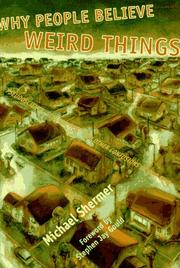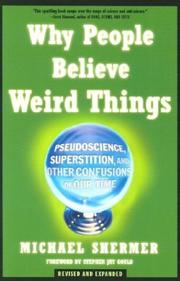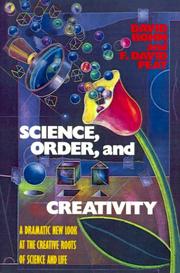| Listing 1 - 10 of 173 | << page >> |
Sort by
|
Book
Year: 1976 Publisher: Wageningen: AFDELINGEN VOOR SOCIALE WETENSCHAPPEN AAN DE LANDBOUWHOGESCHOOL,
Abstract | Keywords | Export | Availability | Bookmark
 Loading...
Loading...Choose an application
- Reference Manager
- EndNote
- RefWorks (Direct export to RefWorks)
Book
Abstract | Keywords | Export | Availability | Bookmark
 Loading...
Loading...Choose an application
- Reference Manager
- EndNote
- RefWorks (Direct export to RefWorks)
What is creativity? There are many definitions, many of which involve trying different experiences, searching for new solutions, exercising our brains, and meeting and talking with new people. To be creative we need to believe in our skills and step outside our comfort zones in the search for new challenges. This book is a discussion of creativity in four parts: creativity behaviour, creativity learning, creativity in science and arts, and creativity tendencies. Chapters address such topics as creativity in children, creativity in education, creativity at the emotional level, and more.
Book
Abstract | Keywords | Export | Availability | Bookmark
 Loading...
Loading...Choose an application
- Reference Manager
- EndNote
- RefWorks (Direct export to RefWorks)
What is creativity? There are many definitions, many of which involve trying different experiences, searching for new solutions, exercising our brains, and meeting and talking with new people. To be creative we need to believe in our skills and step outside our comfort zones in the search for new challenges. This book is a discussion of creativity in four parts: creativity behaviour, creativity learning, creativity in science and arts, and creativity tendencies. Chapters address such topics as creativity in children, creativity in education, creativity at the emotional level, and more.

ISBN: 9004456961 9051837194 Year: 1995 Publisher: Amsterdam : BRILL,
Abstract | Keywords | Export | Availability | Bookmark
 Loading...
Loading...Choose an application
- Reference Manager
- EndNote
- RefWorks (Direct export to RefWorks)
Der Band versammelt eine Reihe von Beiträgen, die sich mit einem bedeutenden, aber bisher in der Forschung vernachlässigten Aspekt der Wissenschaftsgeschichte und Wissenssoziologie beschäftigen: der Geschichte und Aktualität des Verhältnisses von Dilettanten und institutionalisierter Wissenschaft. Die Wissenschaft ist aus der vielfältigen und fruchtbaren Zusammenarbeit von Wissenschaftlern und interessierten Laien hervorgegangen, einer Herkunft, die heute in Vergessenheit geraten ist. Dilettanten oder Virtuosi fungierten als Mäzene, als Anreger und Mitarbeiter, als begeisterte Werber für die Akzeptanz der Wissenschaften bei Kirche, Staat und Gesellschaft. Sie betrieben die Ablösung der Wissenschaftssprache Latein durch die Volkssprachen und erzielten damit eine enorme Breitenwirkung. Zudem ermöglichten sie damit wissenschaftlich interessierten Frauen - wenn auch selten anerkannt - am Diskurs teilzunehmen. Erst mit der Aufteilung und Institutionalisierung der einzelnen wissenschaftlichen Disziplinen wurde der Amateurstatus zum Argument, um Kritik und Ideen, die nicht in den mainstream der Forschung paßten, zu disqualifizieren.
Book
Abstract | Keywords | Export | Availability | Bookmark
 Loading...
Loading...Choose an application
- Reference Manager
- EndNote
- RefWorks (Direct export to RefWorks)
What is creativity? There are many definitions, many of which involve trying different experiences, searching for new solutions, exercising our brains, and meeting and talking with new people. To be creative we need to believe in our skills and step outside our comfort zones in the search for new challenges. This book is a discussion of creativity in four parts: creativity behaviour, creativity learning, creativity in science and arts, and creativity tendencies. Chapters address such topics as creativity in children, creativity in education, creativity at the emotional level, and more.
Book
ISBN: 9780190212308 Year: 2020 Publisher: New York : Oxford University Press,
Abstract | Keywords | Export | Availability | Bookmark
 Loading...
Loading...Choose an application
- Reference Manager
- EndNote
- RefWorks (Direct export to RefWorks)
Science is both a creative endeavor and a highly regimented one. It involves surprising, sometimes unthinkably novel ideas, along with meticulous exploration and the careful exclusion of alternatives. At the heart of this productive tension stands a human capacity typically called 'the imagination': our ability, indeed our inclination, to think up new ideas, situations, and scenarios and to explore their contents and consequences in the mind's eye. This volume explores our capacity to imagine and its implications for the philosophy and practice of science. One central aim is to integrate philosophical and psychological philosophical viewpoints and to assess central questions both empirically and theoretically. Such questions include the roles of models, metaphors, and thought experiments; the correct way to understand scientific fictions; the development of imaginative capacities; and the connection between the imagination and scientific practices such as abstraction, idealization, and counterfactual reasoning.

ISBN: 0716730901 9780716730903 Year: 1997 Publisher: New York (N.Y.): A.W.H. Freeman/Owl Book,
Abstract | Keywords | Export | Availability | Bookmark
 Loading...
Loading...Choose an application
- Reference Manager
- EndNote
- RefWorks (Direct export to RefWorks)

ISBN: 0805070893 Year: 2002 Publisher: New York (N.Y.): A.W.H. Freeman/Owl Book
Abstract | Keywords | Export | Availability | Bookmark
 Loading...
Loading...Choose an application
- Reference Manager
- EndNote
- RefWorks (Direct export to RefWorks)
Book
ISBN: 9780285638037 Year: 1997 Publisher: London : Souvenir Press,
Abstract | Keywords | Export | Availability | Bookmark
 Loading...
Loading...Choose an application
- Reference Manager
- EndNote
- RefWorks (Direct export to RefWorks)

ISBN: 0553344498 0553344498 9780553344493 9780553344493 Year: 1987 Publisher: Toronto: Bantam books,
Abstract | Keywords | Export | Availability | Bookmark
 Loading...
Loading...Choose an application
- Reference Manager
- EndNote
- RefWorks (Direct export to RefWorks)
Science --- Creative ability in science --- Order (Philosophy)
| Listing 1 - 10 of 173 | << page >> |
Sort by
|

 Search
Search Feedback
Feedback About UniCat
About UniCat  Help
Help News
News